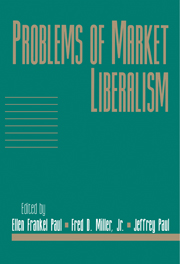Book contents
- Frontmatter
- Contents
- Introduction
- Acknowledgments
- Contributors
- Why All Welfare States (Including Laissez-Faire Ones) Are Unreasonable
- Measuring Opportunity: Toward a Contractarian Measure of Individual Interest
- Deontic Restrictions Are Not Agent-Relative Restrictions
- Why Even Egalitarians Should Favor Market Health Insurance
- Affirmative Action and the Demands of Justice
- The Dual Role of Property Rights in Protecting Broadcast Speech
- Regulation of Foods and Drugs and Libertarian Ideals: Perspectives of a Fellow-Traveler
- Profit: The Concept and Its Moral Features
- Natural Property Rights: Where They Fail
- Toward a Libertarian Theory of Class
- Libertarianism as if (the Other 99 Percent of) People Mattered
- On the Failure of Libertarianism to Capture the Popular Imagination
- Imitations of Libertarian Thought
- Index
Regulation of Foods and Drugs and Libertarian Ideals: Perspectives of a Fellow-Traveler
Published online by Cambridge University Press: 26 January 2010
- Frontmatter
- Contents
- Introduction
- Acknowledgments
- Contributors
- Why All Welfare States (Including Laissez-Faire Ones) Are Unreasonable
- Measuring Opportunity: Toward a Contractarian Measure of Individual Interest
- Deontic Restrictions Are Not Agent-Relative Restrictions
- Why Even Egalitarians Should Favor Market Health Insurance
- Affirmative Action and the Demands of Justice
- The Dual Role of Property Rights in Protecting Broadcast Speech
- Regulation of Foods and Drugs and Libertarian Ideals: Perspectives of a Fellow-Traveler
- Profit: The Concept and Its Moral Features
- Natural Property Rights: Where They Fail
- Toward a Libertarian Theory of Class
- Libertarianism as if (the Other 99 Percent of) People Mattered
- On the Failure of Libertarianism to Capture the Popular Imagination
- Imitations of Libertarian Thought
- Index
Summary
INTRODUCTION
For one with libertarian sympathies, the official regulation of foods and drugs is presumptively a bad thing. One is most accustomed to seeing the argument in debates about legalizing marijuana and other hedonic drugs. And it remains a very good if by now well-trafficked question, which will be more well-trafficked still by the time this essay ends, why government should be in the business of telling people what sorts of chemical moodenhancers they may take. But as the cruninologist James Jacobs has pointed out, to ask this question is to put in play matters far larger and more important than marijuana. What business is it of government to say what medicines may be sold and by whom they may be sold? Why should certain chemical agents be available to willing buyers only with a doctor's scrip, and other agents, such as unproved drugs or devices, forbidden to all, even with medical permission? If libertarians answer these questions impatiently, then admirers of the administrative welfare state (“statists”) will be happy to play rope-a-dope with them, chattering on about the endearing eccentricities of libertarians' assumptions and avoiding the challenge to articulate and defend their own increasingly shabby-looking principles. Those principles are much in need of defense. Food and drug laws are among the most well-established offices of regulatory government. They are complicated, hypertechnical, mysterious, and expensive to administer and maintain. One is entitled to suspect that a number of them are carried on more out of habit and routine than out of any authentic conviction that they are the best way, or among the better ways, to provide for the welfare of citizens.
- Type
- Chapter
- Information
- Problems of Market Liberalism , pp. 209 - 242Publisher: Cambridge University PressPrint publication year: 1998



